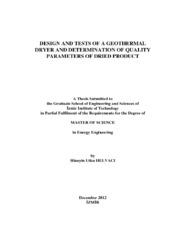Please use this identifier to cite or link to this item:
https://hdl.handle.net/11147/3546Full metadata record
| DC Field | Value | Language |
|---|---|---|
| dc.contributor.advisor | Gökçen Akkurt, Gülden | - |
| dc.contributor.author | Helvacı, Hüseyin Utku | - |
| dc.date.accessioned | 2014-07-22T13:51:46Z | - |
| dc.date.available | 2014-07-22T13:51:46Z | - |
| dc.date.issued | 2012-12 | - |
| dc.identifier.uri | http://hdl.handle.net/11147/3546 | - |
| dc.description | Thesis (Master)--Izmir Institute of Technology, Energy Engineering, Izmir, 2012 | en_US |
| dc.description | Includes bibliographical references (leaves: 70-77) | en_US |
| dc.description | Text in English; Abstract: Turkish and English | en_US |
| dc.description | xii, 85 leaves | en_US |
| dc.description | Full text release delayed at author's request until 2016.01.30 | en_US |
| dc.description.abstract | Drying which is a heat and mass transfer process between the product surface and its surrounding medium and within the product is practised to enhance the storage life and reduce transportation costs of products. Olive leaves are the plants which have been used for medicinal purposes are often dried before use. Renewable energy sources such as geothermal energy can be used in drying processes as heat source besides fossil fuels. The temperature and the thermal potential of geothermal resources in Turkey is high enough to be used in drying process. In this thesis, a geothermal cabinet type drier was constructed and placed in Balcova-Narlidere geothermal field. To be able to determine drying parameters (temperature and velocity) and whose effects on drying kinetics of olive leaves and on the quality parameters of dried olive leaves (antioxidant content and phenolic content), drying experiments were carried out at three different air temperatures (40, 50 and 60 °C) and at three air velocities (0.5, 1, 1.5 m/s). During the experiments temperature, relative humidity and velocity of drying air was measured and recorded. Then, using the measured data drying time, drying rate, moisture ratio and effective diffusivity was determined and moisture ratio was modelled using thin-layer models. The quality parameters which are total antioxidant activity and total phenolic content were determined using spectrophotometric techniques. To evaluate the performance of the dryer, energy and exergy analyses were conducted. The drying time was determined as 240 – 555 min. (4 – 10) hour which is quite short comparing with open air sun drying. Optimum drying air temperature and velocity which gives the minimum total phenolic content and antioxidant loss value were determined by response surface methodology as 50 °C and 1 m/s, respectively. The energy utilization was found 0.3316 kW and the energy utilization ratios were found 50.36% and 7.96% for the case at drying air is re-circulated and the case at drying air was no re-circulated, respectively. | en_US |
| dc.language.iso | en | en_US |
| dc.publisher | Izmir Institute of Technology | en_US |
| dc.rights | info:eu-repo/semantics/openAccess | en_US |
| dc.subject.lcsh | Geothermal resources | en |
| dc.subject.lcsh | Drying apparatus--Testing | en |
| dc.title | Design and Tests of a Geothermal Dryer and Determination of Quality Parameters of Dried Product | en_US |
| dc.type | Master Thesis | en_US |
| dc.institutionauthor | Helvacı, Hüseyin Utku | - |
| dc.department | Thesis (Master)--İzmir Institute of Technology, Energy Systems Engineering | en_US |
| dc.relation.publicationcategory | Tez | en_US |
| dc.identifier.wosquality | N/A | - |
| dc.identifier.scopusquality | N/A | - |
| item.openairetype | Master Thesis | - |
| item.cerifentitytype | Publications | - |
| item.grantfulltext | open | - |
| item.fulltext | With Fulltext | - |
| item.openairecristype | http://purl.org/coar/resource_type/c_18cf | - |
| item.languageiso639-1 | en | - |
| crisitem.author.dept | 01. Izmir Institute of Technology | - |
| Appears in Collections: | Master Degree / Yüksek Lisans Tezleri | |
Files in This Item:
| File | Description | Size | Format | |
|---|---|---|---|---|
| 458477.pdf | MasterThesis | 2.64 MB | Adobe PDF |  View/Open |
CORE Recommender
Page view(s)
408
checked on Apr 7, 2025
Download(s)
480
checked on Apr 7, 2025
Google ScholarTM
Check
Items in GCRIS Repository are protected by copyright, with all rights reserved, unless otherwise indicated.